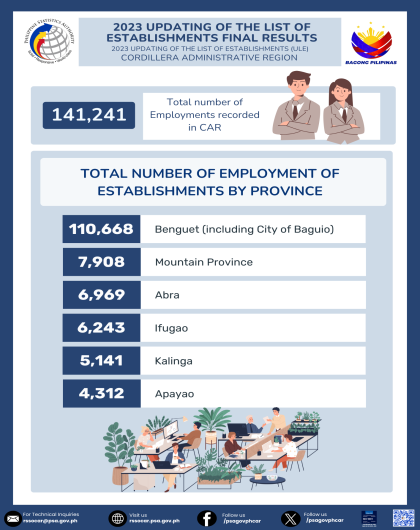The Updating of List of Establishments (ULE) provides a reliable directory of businesses used a statistical frame for PSA’s establishment surveys. It also provides statistics on basic characteristics of businesses useful in economic planning and decision making of the government and private sector.
Wholesale and retail trade industry dominated establishment count
- A total of 18,119 establishments in the Cordillera Administrative Regions (CAR) were registered in 2015 ULE.
-
There were 8,045 Wholesale and Retail stores (Sector G) in the region, which composed 44.4 percent of the total establishments.
-
Accommodation and Food Service (Sector I) followed with 3,239 establishments or 17.9 percent of the total establishments in the entire region. Manufacturing establishments (Sector C) came third with 2,074 or 11.4 percent.
-
The industry sectors with less than 100 establishments in CAR were the following:
Construction (Sector F), Agriculture, Forestry and Hunting (Sector A), Transport and Storage (Sector H), Mining and Quarrying (Sector B) and Water Supply, Sewerage, Waste Management and Remediation Activities (Sector E).
-
In terms of grouping by employment, majority of the businesses were micro establishments with a total of 16,850 or a share of 93.0 percent. These are businesses with employment size of less than 10.
-
Three in four micro establishments were operating either in Wholesale and Retail Trade, Accommodation and Food Service (Sector G) or Manufacturing (Sector I).
-
Small establishments or those with 10-99 employees comprised 6.5 percent share.These were also concentrated in Sectors G and I and those operating under the Education sector (Sector P).
-
Businesses with 100 or more employment or the medium and large establishments shared only 0.5 percent (83 establishments) of the total establishments in the region.
-
About half (49.0 percent) of the business establishments in CAR were in Baguio City with a count of 8,872 establishments.
-
Kalinga (8.2 percent), Mountain Province (8.0 percent) and Abra (6.1 percent) all listed more than one thousand establishments.
-
Apayao and Ifugao registered less than one thousand establishments with 319 and 878, respectively.
CAR establishments employed 104,833 workers
-
Out of the 18,119 establishments, a total of 104,833 persons were working in different economic industries in the region in 2015.
-
Industries with the most number of establishments also employed the most number of workers. Sectors G, I and C had employment shares of 24.1 percent, 16.7 percent and 12.4 percent, respectively.
-
Transport and Storage employed the least with 328 workers in 28 establishments. Agriculture, forestry and fishing establishments had only 349 workers among its 28 businesses in the region.
-
The micro enterprises (16,850 establishments) employed 43,333 individuals or 41.3 percent of the total employment generated by all establishments in the region. This meant that micro enterprises were the biggest employer among businesses by size grouping.
-
Large companies (44 establishments) came next with a total of 31,585 workers in the whole Cordillera which comprised 30.4 percent of total employment.
-
Medium-sized enterprises (39 establishments) employed the least with 5,220 workers.
Average employment per establishment in Baguio City was 8 workers
-
About two in three (64.8 percent) workers in CAR establishments were employed in Baguio City. With 8,872 businesses situated in Baguio, the average number of employees were eight (8) workers per establishment.
-
Benguet was the second biggest employer with 19,641 individuals employed by its establishments or 18.7 percent of the total. It also followed Baguio City in terms of average employment of establishments with five (5) workers.
-
An average employment of four (4) per establishment was registered in the provinces of Abra, Apayao and Kalinga.
-
Mountain Province had an average two (2) workers per establishment but Apayao still had the lowest number of establishments and employment generated in the region.
Technical Notes
| 2009 Philippine Standard Industrial Classification | Employment Size |
| A - Agriculture, Forestry, and Fishing | Micro 1 - 9 |
| B - Mining and Quarrying | Small 10 - 99 |
| C - Manufacturing | Medium 100 - 199 |
| D - Electricity, Gas, Steam, and Air Conditioning Supply | Large 200 - over |
|
E - Water Supply; Sewerage, Waste Management and Remediation Activities
|
|
| F - Construction | |
|
G - Wholesale and Retail Trade; Repair of Motor Vehicles and Motorcycles
|
|
| H - Transport and Storage | |
| I - Accommodation and Food Service Activities | |
| J - Information and Communication | |
| K - Financial and Insurance Activities | |
| L - Real Estate Activities | |
| M - Professional, Scientific and Technical Activities | |
| N - Administrative and Support Service Activities | |
| P - Education | |
| Q - Human Health and Social Work Activities | |
| R - Arts, Entertainment, and Recreation | |
| S - Other Service Activities |


